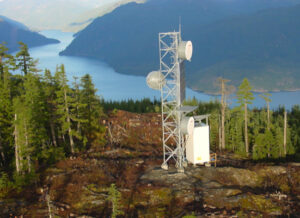Meeting the challenge – Sechelt, BC RF Repeater Station
 Public utilities, especially electric power utilities, need highly reliable communications and control networks. In the case of microwave radio networks, it is common for utility companies to specify the propagation reliability objective of 99.9995% per hop. Equipment and facilities must also meet demanding reliability objectives.
Public utilities, especially electric power utilities, need highly reliable communications and control networks. In the case of microwave radio networks, it is common for utility companies to specify the propagation reliability objective of 99.9995% per hop. Equipment and facilities must also meet demanding reliability objectives.
Peninsula Engineering Solutions was given an opportunity to participate in the design of a microwave link for BC Hydro in British Columbia, Canada. The objective was to connect Cottle Hill Radio on Vancouver Island to Clowholm Hydroelectric Generating Station on the mainland at the end of Salmon Inlet. The 73 km link included 43 km over water across the Georgia Strait. An active RF repeater station was proposed on Sechelt Mountain as an intermediate relay. Since no line-of-sight existed from the repeater station to the generating station, a passive “billboard” reflector was planned to reflect the microwave beam onto the last 1.7 km hop to the dam.
The challenges included: meeting very high system reliability, a repeater site with no road access and no electric power, plus withstanding winter snows and storms.
The over water hop was expected to experience multipath fading and possibly ducting. The solution selected was hybrid space, frequency, and polarization diversity at 11 GHz. Traffic capacity is 16-DS1 in a 10 MHz channel with 16QAM radios. An RF-11000-99, 2+0, 4-amplifier, 4-port repeater is used, with sections supporting each frequency pair and polarization. Both sets of frequencies are sent on to the radios at Clowholm where diversity switching is completed. Over the dozen years this link has been in service, active fading has been observed but very few to no outages. Paths on both sides of the repeater are tilted which reduces interaction with atmospheric layering, a cause of fading. The calculated 2-way, end-to-end link reliability is 99.99988% with fixed modulation radios.
Each repeater’s linear amplifiers are internally protected with dual DC power feeds making them highly reliable. The low DC power consumption of the PESI repeaters make them ideal for off-grid, remote site operation.
Sechelt Mountain repeater site is powered by a 4-kW solar photovoltaic array and storage batteries. Batteries provide 2 weeks of operational autonomy from full charge. Standby, propane fueled, thermal electric generators provide added power during the depth of winter. The solar array is mounted vertically on the tower to minimize snow loading. The size of the array was increased to compensate for the nonoptimum tilt angle and generate adequate power throughout the seasons. The power system is completely redundant with power sharing, thus adding to the station’s operating reliability.
Helicopters lifted the equipment and crews to the mountain top from an airfield 20 km away. The repeater site is operated remotely and serviced once or twice each year for maintenance and fuel supply.
Sechelt RF repeater is a superb example of how PESI has met significant challenges and succeeded.
Peninsula Engineering Solutions is thankful to the management and crews at BC Hydro for all their efforts in making this project a success.
